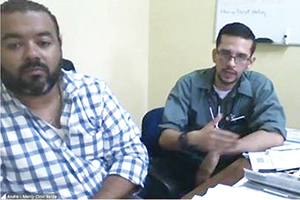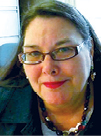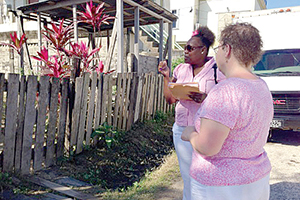Government health service may spread best practices in geriatric medicine widely
By PATRICIA CORRIGAN
In the Central American nation of Belize, more than 41 percent of the population lives below the poverty level, and many elderly people struggle to meet basic daily needs. Belize has no gerontologists — medical professionals who study the aging process — and few elder care facilities or programs. "The Situational Analysis of Older Persons Belize 2010" report concluded that: "There are insufficient, inaccessible and unavailable health services, particularly for older persons."

Dr. Omar Aviles, right, a primary care physician and clinical director at Mercy Clinic in Belize City, Belize, has the clinic's information technology support staffer Andre O'Brien present for the first teleconference with Dr. Christian Davis Furman. Furman has advanced Aviles' knowledge of geriatrics and consulted with him on 36 patients through an initiative facilitated by the Sisters of Charity of Nazareth, KentuckyOne Health and CHI's Mission and Ministry Fund.
Recognizing the challenging situation facing the elderly in Belize, KentuckyOne Health, its parent Catholic Health Initiatives and the Sisters of Charity of Nazareth, who have a ministry in Belize City, forged a collaboration to aid the low-income elderly population in Southside Belize City. It focuses on social supports, housing, food access, transportation and medical care — five dimensions that impact the health and well-being of older people.
The health care collaboration has resulted in a fundamental change in how clinicians at the Mercy Clinic in Belize City approach health care delivery for older adults. Now, the Belize Ministry of Health is considering recommending that the clinic's eldercare practices and protocols be adopted throughout the country.
Increasing care access
Though the changes in clinical protocols at the Mercy Clinic were enabled by a telehealth technology platform, they came about through personal connections and were made more effective by the insider's knowledge of Sr. Carlette Gentle, SCN, a Belizean social worker. In January 2014, Sr. Gentle went door-to-door to ask elderly residents in Southside Belize City about their unmet needs. Information she gathered was incorporated into a grant application to the CHI Mission and Ministry Fund to support greater access to health care.
Deborah Burton, manager of telehealth at Louisville, Ky.-based KentuckyOne Health, said the Sisters of Charity of Nazareth donated a van with wheelchair access for Sr. Gentle to use to transport patients to the Mercy Clinic. It is one of two handicap accessible vans in the entire country, Burton said. The clinic sees about 800 patients each month, many of them elderly. The staff includes four doctors, two nurses, a pharmacist and a social worker.

Burton
Sr. Gentle put Burton in touch with Dr. Omar Aviles, a primary care physician and clinical director at Mercy Clinic. In turn, Burton connected Aviles to Dr. Christian Davis Furman, medical director at the Institute for Sustainable Health and Optimal Aging and the Margaret Dorward Smock Endowed Chair in Geriatric Medicine at the University of Louisville. Furman agreed to provide telehealth consultations to Aviles in the specialized care of elderly patients using KentuckyOne's technology platform.
"In Belize, Dr. Aviles has no colleagues he can call to discuss problems with treatments or prescriptions, and that's where telehealth comes in. It's a tool, a way of using technology," Burton said. "As the relationship between Dr. Furman and Dr. Aviles has evolved, this simple link, this sharing of information and expertise, has made a significant impact."
The telehealth project is part of a three-year grant for $202,000, provided to the Sisters of Charity by CHI's Mission and Ministry Fund. Sr. Gentle administers the grant.
"The telehealth project is a tiny piece of a huge scope of work," Burton said.
Telehealth component
Furman said the goal of her telehealth sessions with Aviles has been to offer instruction in geriatric medicine that Aviles could use and pass on to his colleagues and his patients.
KentuckyOne provided Aviles with a laptop with a webcam, and then Burton trained Aviles and Furman how to use the videoconferencing technology. Since April 2017, Furman and Aviles have conducted 12 monthly case conferences discussing 36 patients and Furman has shared numerous research reports and presentations with Aviles.
Aviles noted that in treating elderly patients, Mercy Clinic previously had relied on health care practices and protocols it used for the general adult population. That has changed.
"Dr. Furman showed us that those practices and protocols, while thorough and useful, largely ignore key issues that are specific to older adults, such as dementia, functional impairment and geriatric depression," Aviles said. "She also pointed out vitally important health issues that we were ignoring. Because of these consults, we've realized how deficient we've been in helping our elderly population, so we're in the process of changing and expanding our entire practice."

Sr. Carlette Gentle, SCN, center, and Sr. Marie Flowers, SCN, survey elderly residents in Belize City in January 2014 to collect information on their needs. Sr. Gentle, a social worker, administers the telemedicine collaboration that allowed Dr. Omar Aviles of the Mercy Clinic in Belize City to learn better practices for treating elderly patients from a geriatric medicine specialist in Louisville, Ky., who also provides patient consults.
Early on, the monthly teleconsultations centered around reviewing cases and patients. "The last few months, we have focused on dementia — how to screen for it and test for it," Furman said. "Though they had them on hand, the staff had been reluctant to prescribe medications, thinking that only specialists could prescribe them, but now they are actively treating patients for dementia."
Building connections
KentuckyOne has helped Aviles in other ways, as well. It provided him with some advanced medical equipment, including an electronic stethoscope, and it sent the clinic portable technology which allows health care workers to measure, store and share blood pressure, oxygen saturation, heart rate, temperature, electrocardiogram and blood glucose data of homebound individuals.
Though the grant ends in July, Burton noted that whether conversations between Aviles and Furman continue is up to them. "Of course, now Dr. Aviles has the technology he needs to connect with other physicians and form new relationships as well," Burton said.
"From the beginning, it took a grant plus the willingness to spend time on the part of a big health care system with a faith-based focus, an academic medical center and a primary care physician in Belize," she said. "It's just been a great collaboration among good people."
Spreading best practices
All along the way, Aviles has reported his conversations with Furman to the clinic's supervisory body, the National Health Insurance of Belize, a branch of the Social Security Board of Belize. "They were immediately receptive to the changes in the practice that we were proposing," Aviles said. He added that government officials now are considering changes in the geriatric health care delivery throughout the country.
The shortage of geriatricians is not confined to Belize. The American Geriatrics Society reports that there are fewer than 7,300 certified geriatricians practicing in the U.S. In order to care for more than 14 million older Americans by 2030, some 30,000 geriatricians will be needed.
"We have a tsunami of people aging, and there are shortages of health care providers at every level," Burton said. "We've got to find a way to bridge that gap, and the only way is through technology." Laughing, she added, "I want this to be in place before I need it."
Copyright © 2018 by the Catholic Health Association
of the United States
For reprint permission, contact Betty Crosby or call (314) 253-3490.